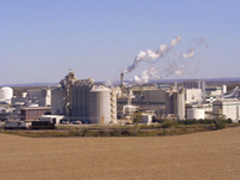Features
BP and Verenium's JV is named Vercipia Biofuels
Date: 2009-07-31 11:39:38.0
Author: PR Newswire
BP and Verenium Corporation have revealed that their 50-50 joint venture company will operate under the name Vercipia Biofuels, and plan to relocate its corporate headquarters to Florida.
The JV continues to focus on the development of one of the USA's first commercial-scale cellulosic ethanol facilities, located in Highlands County, Florida. The company is also developing a second commercial-scale cellulosic ethanol site in the Gulf Coast region.
"I continue to be pleased and enthusiastic with the progress our joint venture - Vercipia - has made in only a few short months, and I look forward to a highly productive and successful next two years as we move toward bringing a first commercial facility into production," said Carlos Riva, President and Chief Executive Officer at Verenium.
"BP's 'all of the above' approach to meeting America's future energy needs includes a significant investment in biofuels development, as this project demonstrates," said Susan Ellerbusch, President of BP Biofuels North America. "We believe Vercipia will be a key player in the biofuels supply chain in the coming years."
Since announcing the formation of the joint venture company in February, Vercipia has applied for and been selected to move forward with due diligence on a Department of Energy (DOE) Loan Guarantee for the Highlands project, which is now underway. In addition, the team has continued to advance development activity in Florida and on a second site in the Gulf Coast region.
About Vercipia
Vercipia is a 50-50 joint venture (JV) between BP and Verenium. It is a partnership between two world-class energy leaders for the commercialization of next-generation cellulosic ethanol, a renewable transportation biofuel developed from dedicated energy crops and grasses. Vercipia is the commercial entity for the deployment of technology being developed under the first phase of the BP-Verenium partnership and brings together the entrepreneurial technology expertise of Verenium with the global engineering and operations experience of BP. These shared resources are developing one of the first fully-integrated commercial plants in the U.S. and expect to add additional capacity in the Gulf Coast region in the coming years. Vercipia plans to break ground on its first commercial plant in Highlands County, Florida in 2010. For more information on Vercipia, please visit www.vercipia.com.
About Verenium
Verenium Corporation is a leader in the development and commercialization of cellulosic ethanol, an environmentally-friendly and renewable transportation fuel, as well as high-performance specialty enzymes for applications within the biofuels, industrial, and animal health markets. The Company possesses integrated, end-to-end capabilities and cutting-edge technology in pre-treatment, novel enzyme development, fermentation and project development for next-generation biofuels. Through Vercipia, the Company is moving rapidly to commercialize cellulosic technology for the production of ethanol from a wide array of non-food feedstocks, including dedicated energy crops, agricultural waste, and wood products. In addition to the vast potential for biofuels, a multitude of large-scale industrial opportunities exist for the Company for products derived from the production of low-cost, biomass-derived sugars. For more information on Verenium, visit www.verenium.com.
About BP
BP is of one of the world's largest energy companies, providing its customers with fuel for transportation, energy for heat and light, retail services and petrochemicals products for everyday items. It is the largest oil and gas producer in the U.S. and one of the largest refiners. BP is also a leading player in the global biofuels market. Since 2006, BP has announced investments of more than $1.5 billion in biofuels research, development and operations. This includes partnerships with other companies to develop the technologies, feedstocks and processes required to produce advanced biofuels and $500 million over 10 years in the Energy Biosciences Institute (EBI), at which biotechnologists are investigating applications of biotechnology to energy.
Websites: http://www.vercipia.com/
This article has not been tagged with keywords.

